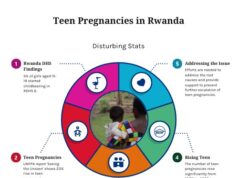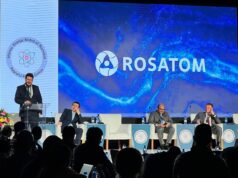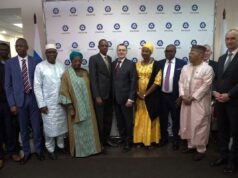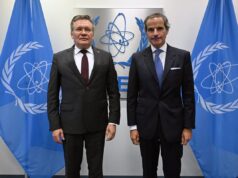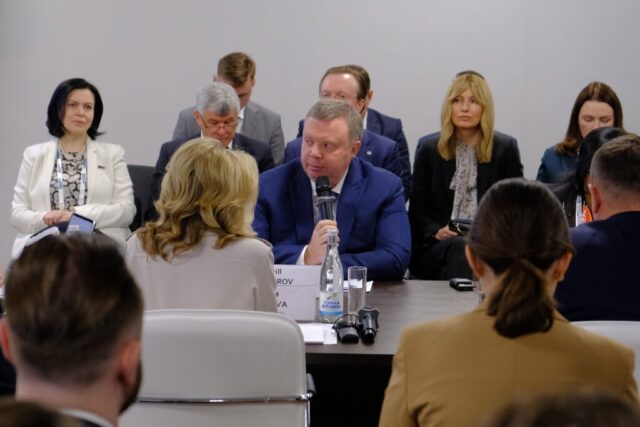
On March 25, at the ATOMEXPO-2024 international forum, a round table Progressive environmental technologies as a global trend in the development of business and government was held.
Lead Russian and international experts, government officials, and Rosatoms business partners from the Brazil, India, China, Ethiopia, the Republic of Belarus, and other countries discussed the priorities for the development of environmental technologies aimed at improving the quality of human life and the state of environment. Particular attention during the discussion was paid to the compliance with international obligations within the framework of the implementation of the provisions of the Stockholm Convention on Persistent Organic Pollutants and the Basel Convention on the Control of Transboundary Movements of Hazardous Wastes and Their Disposal.
Kirill Komarov, First Deputy Director General for Corporate Development and International Business of Rosatom, spoke about global trends in ecotransformation. The introduction of innovative environmental technologies is a necessary condition for achieving the carbon neutrality paradigm. The energy transition to new types of green energy, including nuclear energy, RES, storage systems, solar geoengineering, green cities, quantum solutions and digital environmental monitoring, as well as effective waste management are becoming new business opportunities for the technology development of states. In many of them, Rosatom has already achieved certain success, and it is ready to offer a highly qualified scientific and technology base in partnership interactions. In order to develop and transfer advanced environmental technologies, it is necessary to create an international R&D infrastructure. At the same time, joint discussion of the environmental agenda must remain outside of politics, because the future of our planet and the life of subsequent generations depends on it, he emphasized.
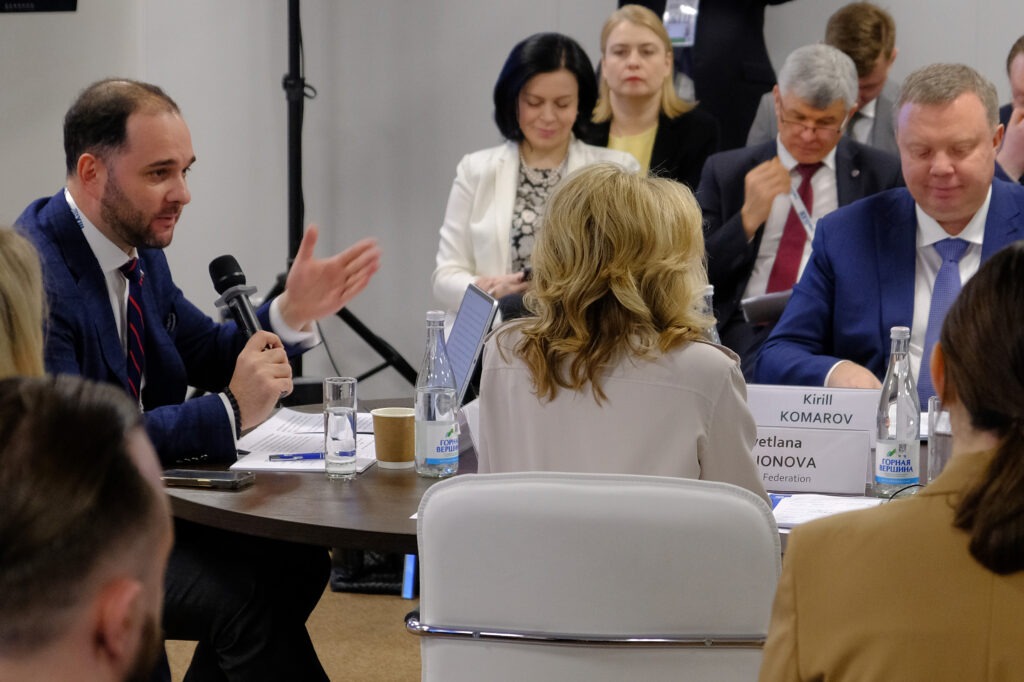
Svetlana Radionova, Head of the Federal Service for Supervision of Natural Resources, drew attention to the fact that fulfilling obligations in the implementation of the provisions of the Stockholm and Basel Conventions was one of the most important tasks of the environmental agenda of the Russian Federation. She took the initiative to support the proposal of the Russian Federation to harmonize deadlines in the framework of decision-making on transboundary movement of waste under the Basel Convention, namely: establishing specific deadlines for sending responses on the possibility/impossibility of importing hazardous waste for the purpose of subsequent safe handling when assessed by the countries party to the convention. Our countrys proposals are based on the principle of prior informed consent, time-bound, to ensure environmental and economic efficiency while respecting environmental regulations. Clear, accurate, and reliable information about the safe disposal of imported wastes in this procedure are important for countries when considering and making import decisions. At the same time, the deadline for the importing country to respond about the possibility/impossibility of import is not regulated at the international level. The consequences of a late response and the impossibility of planning activities can be financial losses, harm to the environment and public health, she noted.
The discussion participants in this area considered the need to exchange best practices, both in pursuance of the provisions of the Stockholm and Basel conventions, and, in general, in the field of elaborating promising and safe environmental solutions, including technologies for the management of hazardous waste in the context of the inclusion of new persistent organic pollutants in the annexes of the Stockholm Convention.
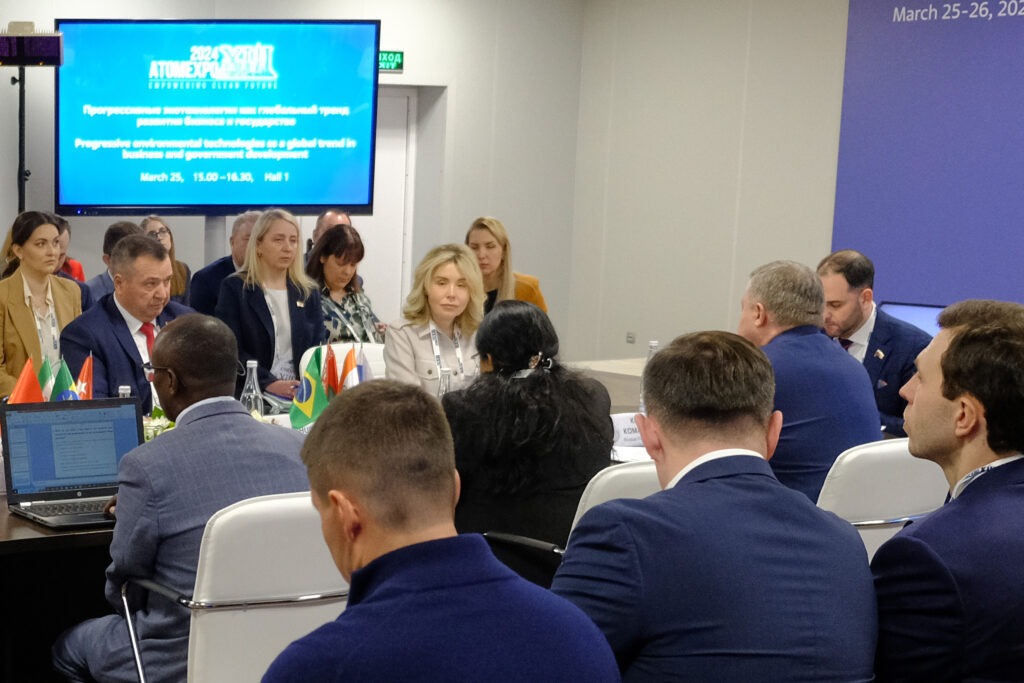
Exchange of experience is crucial when developing and implementing new environmental technologies, especially when complying with international obligations. Close partnerships are needed to learn lessons and discuss the adaptation of technologies developed abroad to local conditions and realities, commented Adalberto Maluf, Vice Minister for Urban Environment and Environmental Quality, the Federative Republic of Brazil.
According to the round table participants, an international partnership dialog on consolidating the efforts of businesses and governments in the field of using advanced environmental technologies, decarbonizing the economy, and scaling successful practices in the world is supposed to ensure the formation of a technology foundation using the best national environmental solutions such as, for example, international scientific and production engineering center for environmental technologies and its advanced developments aimed at improving the standard of living on the planet.
REFERENCE
Rosatom is today developing green areas not directly related to the nuclear industry: wind generation, hydrogen energy, manufacture of energy storage systems, development of electric propulsion, hazardous waste management, additive and digital technologies, nuclear medicine. All these areas have a common denominator ensuring a new quality of life for people and preserving the environment for future generations.
The international forum ATOMEXPO is the main event of the global nuclear industry. It is the largest exhibition and business platform for discussing the current state of the nuclear industry and setting trends of future development. It has been held since 2009. The Forum is attended by executives of key companies in the global nuclear industry, government agencies, international and public organizations, and lead experts. The Forum format includes an exhibition and a congress with an extensive business program, the key event of which is a plenary session. Panel discussions and round tables discuss topics that are most important for the nuclear industry. Top companies in the global nuclear industry and related industries present their technologies and competences at the exhibition.
One of the priorities of the President of the Russian Federation and relevant departments is to increase the efficiency of natural resource management. Major domestic companies pay great attention to the implementation of environmental management projects. Rosatom, producing electricity using low-carbon generation, is consistently implementing the steps for transition to a green economy. Nuclear scientists are modernizing equipment which provides generation of environmentally clean energy, and hundreds of millions of rubles are allocated annually to environmental protection measures. Rosatom takes part in biodiversity conservation projects on our planet. It is engaged in forest replantation, clearing of river banks, stocking of reservoirs. Environmental initiatives become important directions of volunteer activity for the employees of Rosatoms enterprises.
As part of demonstrating Rosatoms commitment to the climate agenda, compensation of the carbon footprint of the XIII International Forum ATOMEXPO-2024 will be ensured using special certificates.





